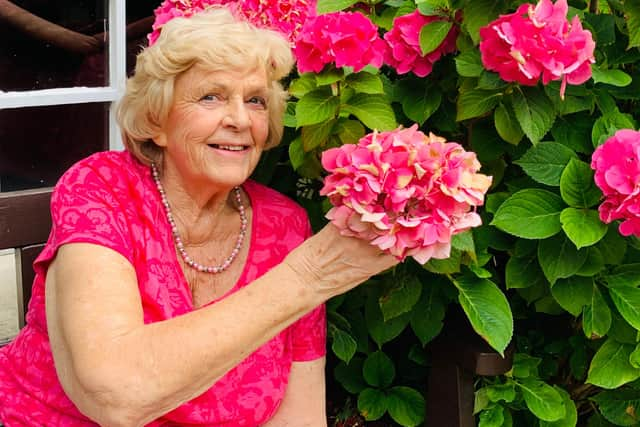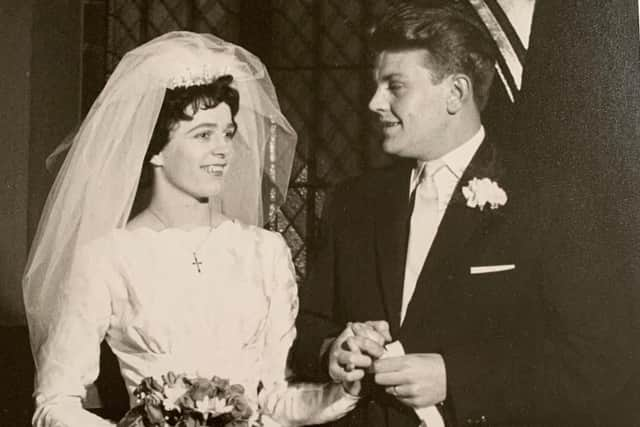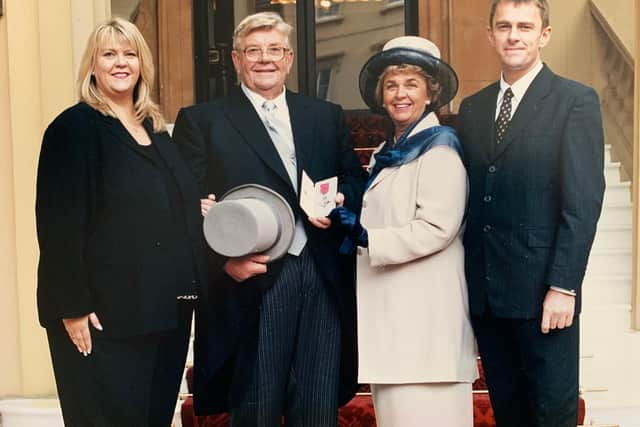Sheffield wartime refugee's amazing journey from Russian labour camp to city via Africa and Iran
and live on Freeview channel 276
Maria Teresa Platts, who lived in Southgrove Road, Ecclesall, died in September after a short illness. Her family have been raising money in her memory for the British Red Cross, who played a vital role in getting Maria’s family to safety.
Maria’s daughter Gay Bell told her mum’s story at her funeral in St William of York Church, Ecclesall Road. Below are excerpts from her eulogy.
Advertisement
Hide AdAdvertisement
Hide AdMaria’s late husband Brian Platts was the much-loved Manor Operatic Society pantomime dame and both were involved in the group.


After seeing Maria’s obituary in The Star, Councillor Mike Chaplin has pointed out that Archangel is in the the far north of European Russia, not Siberia. There were forced labour camps in both areas.
Here is what Gay said about her mother: “Siberia, Russia. 1940. A young woman digs a hole in the snow and buries a small bundle wrapped in blankets.
Earlier that year Stalin’s Soviet army had invaded the east of Poland, devastated the region and captured 1.7 million Polish prisoners as part of an ethnic cleansing campaign.
Advertisement
Hide AdAdvertisement
Hide AdOne of those prisoners was Wanda Adamczyk, pregnant with her second child, who was transported to Siberia with her husband Edmund and their families. Once in Siberia they were separated into male and female slave labour camps.


On August 8, 1940, in a camp in Archangel, Wanda gave birth to a baby girl and named her Maria Teresa. Every morning before she was sent to work, Wanda wrapped her daughter in blankets and buried her in the snow to avoid the Russians taking her away. That baby was Maria - our Mum, grandma, sister, friend and neighbour - whose life we have come together to celebrate today.
Fortune favours the brave and when Hitler turned on the Soviet Union and invaded Russia, Stalin had no choice but to ask the Allies for help. One condition of that help was that the Polish prisoners were given an amnesty.
“They found Edmund who had also made it out”
Just over 100,000 Poles managed to leave. Amongst those to get out of Russia in August 1942 were a two-year-old Maria along with her Mum, brother, and Aunty, who joined a convoy across the mountains and Caspian Sea to Persia, modern-day Iran.


Advertisement
Hide AdAdvertisement
Hide AdHere they were welcomed to a Red Cross refugee camp just outside Tehran where there was plenty of food, doctors, a school and even a Catholic church.
While in Tehran they found Edmund who had also made it out of Siberia. It was the first time he saw his two-year-old daughter and it was sadly the last. He went off to join the Polish brigade of the British Army and lost his life in the war.
Tehran was just a staging post and a few months later Maria’s journey continued across the ocean to Tanganyika (now Tanzania). Here they settled in a thatched mud hut in a Polish refugee camp at the foot of Mount Kilimanjaro.
Mum had really vivid memories of those happy days in Africa. She enthralled Adam and I when we were kids with stories of huge snakes in the trees, lions in the jungle and the pet monkey that weed in her bed. No off-the-shelf bedtime stories in our house, we had our very own jungle book.
"Moving to a big city like Sheffield must have been daunting”
Advertisement
Hide AdAdvertisement
Hide AdAs the war came to an end the Poles could not return home. Poland was under severe Russian rule and most of the east of the country had been annexed into the Soviet Union. The Americans and British stood by their promise to provide the Polish refugees with a permanent home.
Maria and her family travelled to Mombasa and while awaiting passage, Mum learned to swim in the clear blue Indian Ocean. I am sure that is where her love of the sea was born - she always loved to be at the beach.
Wanda and her sister-in-law Stasia really fancied a new life in America, but ever the practical Adamczyks they spotted that a British ship, the HMS Scythia, was leaving earlier and looked a lot less cramped than the American boats. So, on August 15, 1948, at the age of just 8, Maria sailed out of Mombasa destined for Liverpool docks.
They didn’t stay in Liverpool long as they had been assigned a place in a facility for Polish migrants at St Mawgan RAF base just outside Newquay in Cornwall.
Advertisement
Hide AdAdvertisement
Hide AdMaria was back by the sea and she loved Cornwall. Wanda got a job as a seamstress at the Atlantic Hotel in Newquay. They moved into a little house near the harbour, Maria went to school and life was good.
But Cornwall was not to be the long-term home it might have been. Even though Mum returned there many times in her life, and we have many happy Cornish holiday memories.
In 1951 Wanda went to Sheffield to visit Stasia and met Florian, a young Polish man who was lodging at Stasia’s house. They were married later that year.
Moving to a big city like Sheffield must have been pretty daunting to an 11-year-old who had grown up in the jungle. I recall Mum saying how cold and grey it was.
Advertisement
Hide AdAdvertisement
Hide AdThe first time she saw snow she didn’t know what it was and thought someone had dropped washing powder everywhere.
In 1954, Maria got a baby sister, Danuta, who she loved to take care of. They were lifelong friends.
Maria was a good student. She got a scholarship to Notre Dame High School for girts and worked hard. After school she trained as a nurse and worked within the NHS for many years, first nursing, and then in medical research.
"It is astonishing to think about the experiences Mum had”
In 1956 while working a shift as a student nurse Maria met Brian Platts, who was visiting one of her patients – and it was love at first sight. They had a challenging courtship as Maria’s parents wanted her to marry a nice Polish boy.
Advertisement
Hide AdAdvertisement
Hide AdBrian went down to Cornwall to visit Maria when she took a summer job at one of the big seaside hotels and their romance flourished over tea dances and walks along the Newquay golf links.
Anyone who has known Maria and Brian knows they were a very strong partnership. Their 52-year marriage was built on unconditional love and respect. She was always his leading lady.
Our house was never empty. The door was always open and through it came a constant flood of friends and visitors.
From lodgers like Sheffield Wednesday football players and Sheffield University students, to many a thespian, and young people from all corners of the globe eager to learn English - Mum always gave them a home from home.
Advertisement
Hide AdAdvertisement
Hide AdMaria took great joy in her family. She was very proud of Adam and me, and utterly adored her grandchildren Stanley and Ava. She was extremely close to her sister Danuta. And I know she massively approved of our choice of partners – Lisa, Russell, and Chris.
How can you support Maria’s appeal?
Maria had a fabulous and long life. She worked very hard to be secure and successful and enjoyed many adventures and experiences around the world.
Mum was able to return to Poland many times and cherished being in close contact with her Polish family. We all share many memories of visits to Poland especially to the family farm, Gdansk, Sopot, Krakow, Warsaw and a pilgrimage to the Black Madonna of Czestochowa, an important Polish Catholic icon of the Mother of Christ.
When you look back on her life, it is astonishing to think about the experiences Mum had. Her journey as a refugee from Poland to Siberia to Africa to Sheffield shaped her - she was very adaptable, resilient and positive.
Advertisement
Hide AdAdvertisement
Hide AdShe was also very modern in her outlook, open and accepting of people of all race, religion and culture - ahead of her generation, a strong, independent woman - and an inspiration.
Today there are over 26 million refugees in the world, half of which are children. These people, just like Maria, are forced by fate of where they are born to flee persecution and conflict and seek safety in foreign lands. This is why we have chosen to support the British Red Cross and the work they do for refugees in Mum’s memory.
Her luckiest break came when she got to that Red Cross refugee camp in Tehran and we hope that our donations can help others like her."
Maria leaves Adam and Gay, grandchildren Stanley and Ava and sister Danuta.
